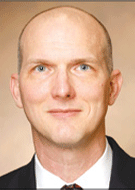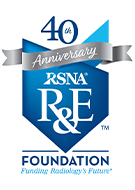Identifying Barriers to Breast Cancer Detection and Treatment in Uganda
R&E Foundation grant supports research and health care summit to address inequities


In Uganda, the incidence of breast cancer has increased by 5.2% every year over the past 15 years. Unfortunately, up to 89% of Ugandan women with breast cancer are diagnosed with late-stage disease (stages III and IV), which are attributed to delays in the diagnostic pathway.
An effective referral system in Uganda triages patients with breast concerns at community health centers (CHC). Patients with suspicious findings are then referred for appropriate diagnostic tests, such as US or tissue sampling, at a higher level of the health care system. This is where patients can begin to struggle in their health care journey. Patients must travel through five to six levels of a seven-tier health care system, usually at their own expense, before accessing these services at the Uganda Cancer Institute (UCI). These suboptimal referral systems after the CHCs result in high rates of delayed
diagnoses, where patients wait longer than the recommended three months from first presentation at primary care to receipt of a pathologic diagnosis.
“Evidence from our situational analysis of breast cancer diagnostic pathways in Uganda demonstrated a dysfunctional referral system, lack of knowledge among both providers and patients of the importance of health seeking behaviors and poor outcomes for women diagnosed with breast cancer, with over 70% diagnosed at advanced stages,” said John Scheel, MD, PhD, MPH, professor and vice chair of global health in the Radiology & Radiological Sciences Department at Vanderbilt University in Nashville, TN, and director of the Breast Health Global Initiative, a nonprofit organization that develops evidence-based and resource-appropriate implementation strategies for breast health care systems. “Our research findings and feedback from patients identified that there was a lack of knowledge about the pathway from the time they present to CHCs with breast symptoms to when they show up to the Uganda Cancer Institute and are diagnosed with breast cancer.”

Research Identified Surprising Factors for Health Care Delays
For his RSNA Education Scholar Grant, Reducing Patient and Health System Delays Contributing to Late Stage Breast Cancer Diagnosis in Uganda, Dr. Scheel and his team from the Breast Health Global Initiative and the Uganda Women’s Cancer Support Organisation recruited 350 women with suspected breast cancer from CHCs and an additional 100 women with symptoms who made it to the UCI. They completed a baseline survey, assessing socio-demographic characteristics and clinical visit information. The researchers followed up in six months and identified a long waiting period between symptom onset and seeking care, and a low percentage of women who successfully accessed diagnostic care.
“The greatest barriers to breast health care distance needed to travel to receive a diagnostic evaluation, family responsibilities and health care costs,” Dr. Scheel said. “Misinformation about breast cancer, and belief that by the time abreast lump can be self-detected it is too late for a cure also affects health seeking behavior.”
The survey elucidated some surprising findings for the researchers.
“We had hypothesized that women who came to UCI would present earlier because they lived close or successfully overcame barriers to accessing breast health care. Instead, we found no difference in delays for women presenting to the UCI and community health centers, with women equally likely to delay seeking care more than 90 days after self-detecting breast symptoms,” Dr. Scheel said.
Results Spur New Guidelines and Breast Health Care Summit
With the information learned from the surveys, Dr. Scheel and his team convened a steering committee of Ugandan breast health experts in October 2021.
The committee sought to educate stakeholders involved in breast health about the Ugandan health care system contributors to late-stage diagnosis and develop the first Ugandan Breast Healthcare Guidelines. Due to COVID restrictions, participants met virtually several times and held an in-person summit in 2022. During a three-day period, over 200 breast health workers, policy makers and survivors from across Uganda, and over 45 international experts in breast health and guidelines development attended.
“Our team worked with the Ugandan Ministry of Health and a Steering Committee of Ugandan leaders to draft guidelines prior to this summit and then used the summit to solicit feedback and modify the guidelines,” Dr. Scheel said. “We submitted the final guidelines to the Ministry of Health, and they have provided two rounds of feedback. We intend to submit the final guidelines in the summer of 2024 for approval and then develop a plan to implement these guidelines in Uganda.”
In addition to the summit, the team worked with policy makers and the Uganda Women’s Cancer Support Organization (UWOCASO) to develop a curriculum to raise breast cancer awareness among providers, patients and communities.
This is the first study to prospectively follow symptomatic women presenting to the CHCs in Uganda. With the awareness and breast guidelines moving forward, all women with suspected breast cancer are counted and followed through the health care system.
To continue the work, Dr. Scheel and team have applied for several industry sponsored grants and an NIH grant.
“We are currently focused on supplying portable diagnostic tests that can build point of care capacity at the CHCs, developing patient navigation that can help address barriers to breast
health care, improving community health education and creating sustainable and robust methods to track patients through the different levels of the system and reduce the lost-to-follow-up rates,” Dr. Scheel said.
Dr. Scheel acknowledged that the initial R&E Foundation grant was beneficial to get his work in Uganda started.
“In addition to providing me the opportunity to fill in a major knowledge gap on what happens to symptomatic women who don’t complete their episode of care, it also confirmed the prevalence of this problem,” Dr. Scheel said. “This grant allowed me to assemble over 200 Ugandan clinicians, policy makers and survivors, along with 50 international experts, to develop national guidelines and an implementation plan that will soon become the standard of care. I am also hopeful that this work will initiate the development of the Breast Health Society of Uganda to continue updating the guidelines, monitor the implementation process and develop quality improvement initiatives to improve population health sustainably.”
For More Information
Help the R&E Foundation celebrate its 40th anniversary at RSNA.org/RE-Foundation.
Learn more about available R&E Foundation grants at RSNA.org/Research/Funding-Opportunities.
Read previous RSNA News stories about R&E Foundation grants:
- Foundation Approves Over $5 Million in Grant Funding
- Research Highlights the Sex and Gender Disparities in Acute Ischemic Stroke
- New Diffusion Basis Spectrum Imaging and Brain PET Identify Neuroinflammation and AD In Overweight and Obese Persons